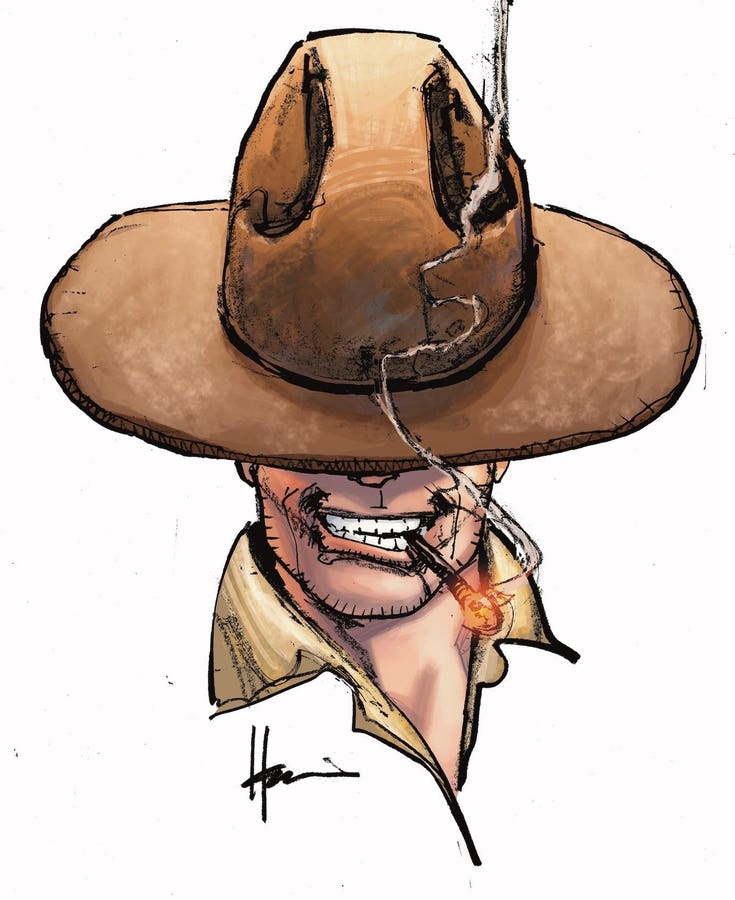In a half century of making comics, artist/writer Howard Chaykin has done it all: groundbreaking work for DC and Marvel, some of the earliest book-length graphic novels, caustic reinventions of traditional characters, an iconic independent series from the 1980s (American Flagg), and provocative creator-owned action thrillers and satirical work down to the present day. Though he is perhaps best known as the first comic artist to draw Star Wars (the huge sales of those issues in the late 1970s might have saved the American comic book business), when I asked him about his notable accomplishments, he notably left that one out.
But there is one trick this old dog is just now trying for the first time: crowdfunding. Chaykin and project producer Michael Stradford are hoping that fans can power Chaykin’s latest project, a historical adventure yard called Fargo, based on paperback potboilers by John Benteen, originally published in the late 1960s and early 70s.
The story has all the ingredients familiar to fans of Chaykin’s work: a two-fisted, hairy-chested action hero (in this case, modeled on actor Lee Marvin), set against a rich backdrop of 20th century history, full of guns, dames, goons, plot twists and knowing references. Stradford and Chaykin had been fans of the work for a while, and managed to obtain the graphic novel rights from the estate.
The plan is to adapt Hell on Wheels, book five of the Fargo series first, since the western-style setting is the most accessible. Chaykin has already written the script and is working on the art, including some promotional images used in the campaign. He is using the new crowdfunding platform Zoop rather than Kickstarter because he believes it offers more support and reach to the specialized part of the comics market where Chaykin’s name carries clout. The campaign launches on October 10.
Chaykin says he turned to crowdfunding because, in his words, he has “aged out” of the mainstream comics industry, having lost his taste for the costumed super-people and laser-sword fantasy stuff that drives sales in the part of the market where Chaykin built his reputation. Part of that is due to changes in the market, and part is his own doing. His recent roman a clef about dirty doings in comic book business through the years, Hey Kids, Comics!, came out on the creator-owned imprint Image, and followed a controversial foray into contemporary politics and culture called Divided States of Hysteria. Neither made him any friends in an industry that is notoriously unkind to its elder statesmen, particularly when it comes to outspoken iconoclasts like Chaykin. When he was inducted into the Will Eisner Hall of Fame in 2022 – a long overdue honor – he declined to attend and sent a terse acceptance speech.
To the fans who remember when he arrived in the 1970s, part of a new generation of talent eager to revolutionize the business with distinctive art styles and a more auteurist approach to the medium, none of that matters. He has stayed remarkably consistent throughout his career, both in terms of themes and artistic style. The problem is that his readers have largely aged out as well.
The biggest question for Chaykin in light of all this is not “why crowdfund?” but rather “what took you so long?” when so many other creators of lesser stature have built or rebuilt careers through crowdfunding for the past decade.
“I’m a great big coward,” Chaykin admits. “I’ve avoided crowdfunding because I’ve been afraid that I would fall flat on my face, quite frankly. I have a small audience. I do work that reflects my own interests. I’m hoping that this book will generate an audience outside of that.”
In addition to the new work he is crowdfunding on Zoop, Chaykin is also partnering with veteran comic book writer Mark Waid for a ticketed seminar called “Comic Book U,” which will debut live at UCLA on November 8, with plans to travel to comic cons.
He says his passion for the medium of comics is undiminished despite his misgivings about the industry. “I love comics,” he said. “I’m a comic book man. I get up in the morning and am at my desk every day solving [storytelling] problems. I derive the same genuine pleasure and genuine joy from the solution and problems related to comics as I have from reading them.”
Read the full article here





